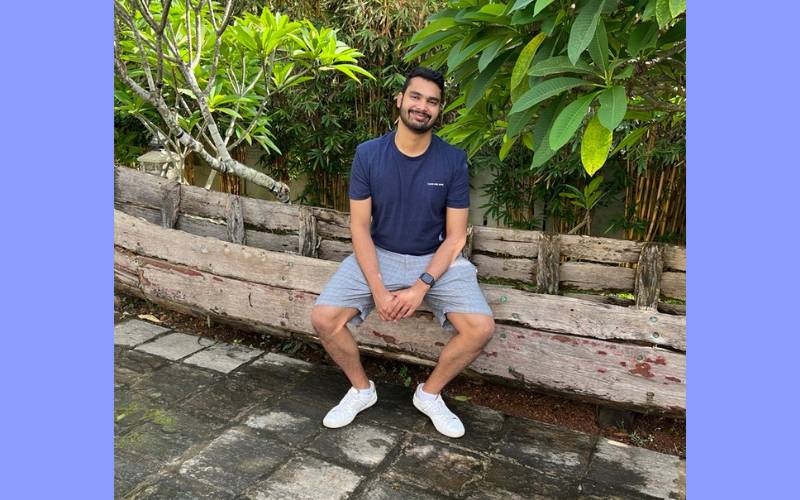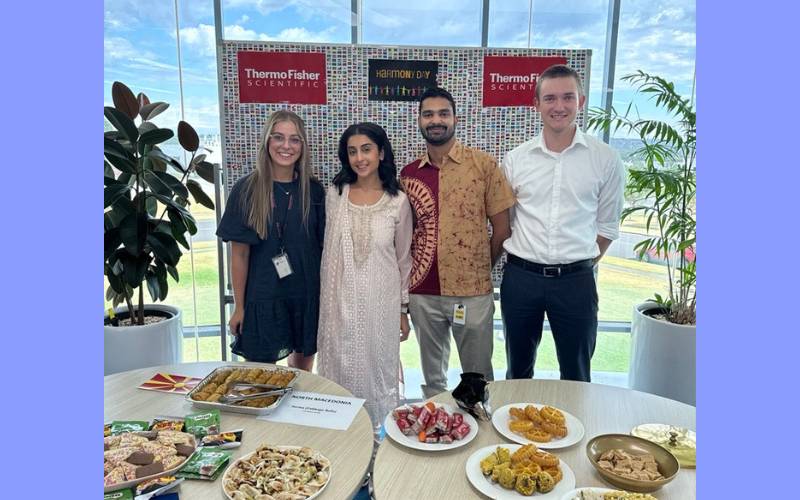
Leading authentically: strategies for success with intersectional identities
Interviews
Asindu Dombepola, Biomedical Engineer at Thermo Fisher Scientific ANZ, spoke to myGwork about how his intersectional identities impact his day-to-day experience in the workplace, and how identity intersects with his professional journey.
Could you please introduce yourself and your role within Thermo Fisher?
My name is Asindu Dombepola and I’m one of 4 Leadership
Graduates in the 2023 Australia and New Zealand (ANZ) Leadership Graduate
Program at Thermo Fisher Scientific ANZ.
I’m a Biomedical Engineer by training and my passion for working
to advance health outcomes via medical technologies in the commercial space led
to be part of the Leadership Grad Program. In this program, we rotate through
three 8-month long roles in a two-year period. My first role was as a Financial
Planning and Analyst business partner for our Specialty Diagnostics and
Analytical Instruments Groups. Currently, I’m finishing up my second rotation
as an Associate Product Manager with our Third-Party Lab Consumables team.
I also recently took over as chapter lead in our company’s ANZ Pride+ group with the goal of reenergising queer representation within our workplace so that colleagues can bring their authentic selves to work.

Can you reflect on your journey as an individual with
diverse intersectional identities in the workplace, discussing the challenges
you have encountered and the strategies you employed to overcome them?
Reflecting on my journey as an individual with diverse
intersectional identities in the workplace, I have encountered various
challenges that have shaped my experiences. As a first-generation Sri Lankan
Australian, the child of migrants, and a millennial queer who has lived in
different cities and countries, I am often in the unique position of being a
"minority within a minority” both in and outside of work.
Over the years, I have learned to embrace and leverage my
identities to make progress and drive change. One strategy I employed to
overcome biases, whether they were racist or homophobic, was to address them
directly in an appropriate manner. By calling out such behaviour, I aimed to
create awareness and promote a more inclusive environment. In situations where
it wasn't possible to address the issue directly, I sought alternative avenues
of recourse (if available).
Another important strategy I utilised was seeking help
when needed. This involved reaching out to colleagues, managers, family/friends
and even seeking mental health support. Initially, asking for help was a
challenge for me, but I soon realised that it was a powerful tool in overcoming
barriers that arose due to my intersectional identities.
Perhaps the biggest challenge I faced was ensuring that
biases, stereotypes, and hurtful comments did not impact my mental health or
lead me to question my worth. For me, self-acceptance and being comfortable in
my own skin became crucial. Embracing who I am, despite the clichés associated
with the term, allowed me to build resilience and maintain a positive mindset.
Overall, my journey has involved navigating challenges through open communication, seeking support, excelling in my work, and fostering self-acceptance. These strategies have helped me overcome obstacles and shape a more inclusive and empowering experience within the workplace.
In what ways do you believe your intersectional
identities shape your experiences within the workplace? How do you navigate and
address the distinctive challenges that arise?
I believe intersectional identities have a significant
impact on experiences within the workplace, as it shapes how you perceive and
navigate the world around you. Personally, I have found that my identity as a
child of migrants in Australia, as well as my lived experiences of growing up
in different cities and countries, played a crucial role in my ability to adapt
quickly and effectively in professional roles, including the rotational roles
in the leadership graduate program. These experiences equipped me with the
skills to rapidly learn and adjust to different societal norms, workplace
culture and expectations, which have been positive force in my professional development.
However, being queer + a visible cultural minority in the workplace and occupying a non-engineering commercial role as an engineer often leads to preconceived notions about my skills and abilities (both positive and negative). This can sometimes create barriers to executing my work effectively, requiring me to push through those perceptions and to prove myself.
To navigate and address these distinctive challenges that arise due to my intersectional identities, I rely heavily on self-awareness and continuous self-development. It often involves understanding my own emotional reactions and biases, as well as exploring practical ways to address issues as they arise. I also tend to consider any available options and resources for raising concerns and resolving conflicts, allowing me to proactively tackle any challenges that may arise.

How do your various intersectional identities impact your
professional journey, and how do you leverage these aspects of yourself?
When reflecting on my professional journey thus far, I find that my intersectional identities both present challenges and provide opportunities for growth and change. Being someone who is naturally analytical has allowed me to optimize my work and bring about meaningful improvements in workflow processes within my current roles. While being a part of cultural minority and identifying as queer may have been seen as challenges in the corporate and engineering fields, these aspects of my identity have also allowed me to bring unique perspectives and lived experiences to my work and workplace.
By reframing these intersectional identities in a positive light, I have been able to contribute to impactful changes, such as celebrating our cultural diversity through events like Harmony Day and taking a leadership role in the ANZ pride chapter. Through these initiatives, we have been able to amplify the voices of the minority + queer communities, fostering a sense of representation, acknowledgement of their contributions at work. These identities have also made me more empathetic, open-minded, and receptive to the uniqueness of others which I believe helped me become a better team player, better assist colleagues when in need and provide a distinct perspective to workplace discussions and initiatives.
Is there a specific story or experience you can share
where you felt empowered and included in the workplace, particularly during
events or initiatives celebrating diversity and inclusion?
An experience that stands out to me was when we organised a
Harmony Day celebration at our workplace recently. Harmony Day aligns with our
national Harmony Week, where businesses across Australia come together to
celebrate diversity and inclusion in the workplace, with the aim of eradicating
racial discrimination. I had the privilege of being part of the organising committee
for this event, and it was a truly empowering and inclusive experience.
As a someone who is from a cultural minority in Australia, I have
often faced challenges growing up and adapting to the wider audience around me.
However, the Harmony Day celebration provided a unique opportunity for me to
showcase a key aspect of my identity - my background and culture - in a very
public and meaningful way. It was a moment of empowerment, as I was able to
express an essential part of who I am and connect it with my professional work.
Being involved in the planning and execution of this event created a deep sense of belonging within my workplace. It was amazing to witness my colleagues come together to appreciate and celebrate the diverse backgrounds and experiences that each of us brings. It not only fostered a sense of inclusion but also reinforced the importance of diversity in our company. It served as a reminder that my unique identity and cultural heritage are valued and respected within the workplace, contributing to a more supportive and inclusive work environment.
Have you encountered any notable barriers or biases in
the workplace, due to your identity? Could you elaborate on the strategies you
have used to navigate such challenges, and do you have any advice for others
facing similar situations?
When reflecting on this question, one notable barrier I
encountered in a previous role at a different workplace comes to mind. I faced
overt biases from a few of my colleagues, which stemmed from their ignorance
about my background and their assumptions about my religion. This was evident
in their behaviour and attitude towards me, particularly during our shift work
in a public setting. It created a challenging work environment, and it seemed
to affect me more than others on the team due to the unique intersectionality I
brought to the table.
To navigate these challenges, I first sought to
understand the situation and the reasons behind the biases. I wanted to gain
clarity on why these individuals were behaving the way they were and where
their ignorance stemmed from. This allowed me to address the issue more
effectively. One strategy I employed was to provide key information and educate
them in a non-confrontational manner. I aimed to share insights about my
background and culture that they may not have been aware of or understood. By
doing so, I hoped to expand their perspective and shed light to their racism
and ignorance in a way that was accessible to them.
If I were to offer advice to others facing similar
situations, I would suggest taking the time to understand why these biases or barriers
are occurring and where they stem from. Once you have gained some insight, I
find it usually can be helpful to address the issue directly in a manner
precise to the situation you are facing. Furthermore, engaging in open and
honest conversations, fostering understanding, and promoting dialogue were also
effective tools that helped me and thus, may help others. By approaching the
situation head-on and sharing information in a constructive way, may help
challenge preconceptions and foster a more inclusive and accepting workplace
environment.

